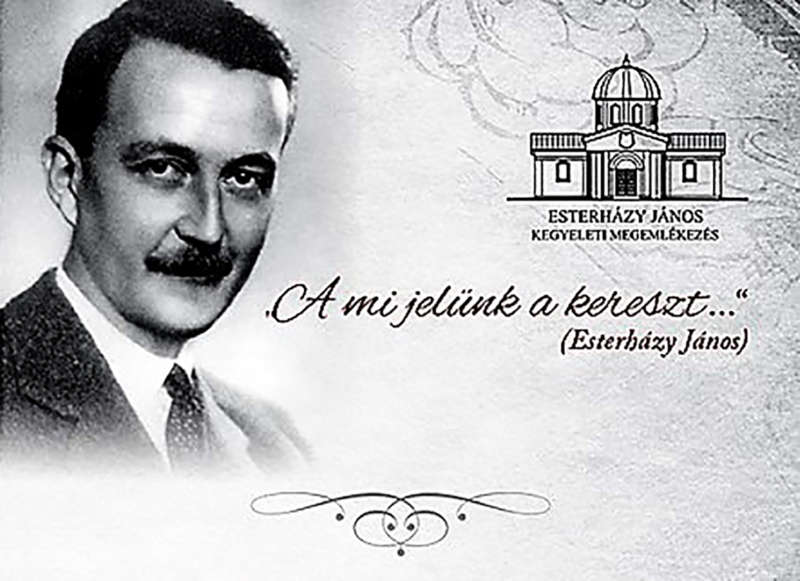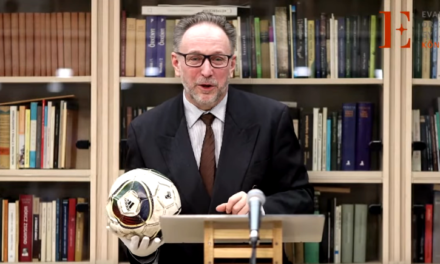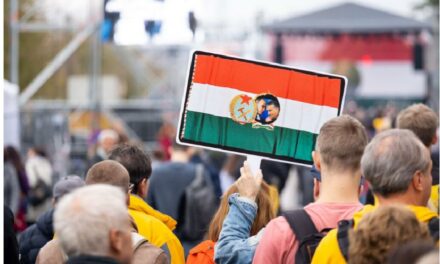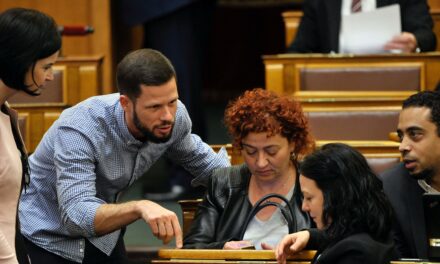Our portal - following Felvidék.ma's article - has already reported that an article by Pravda (the flagship of the Soviet propaganda press operated under this name, so based on the name of the Slovak sister, one can suspect what traditions the communist clerk scribbling in the paper follows) called the martyr János Esterházy a Nazi .
The slander, full of vile lies, would be worthless if it did not reflect the primitive anti-Hungarian sentiment of a – hopefully small – part of Slovaks. The reasons are analyzed in Béla Hrubík's article, which was also published on the Felvidék.ma portal and which is published in its entirety below.
"Recently, in the Slovak newspaper Nový Čas (New Time), and before that in Pravda, those journalists spoke in the voice of the crypto-communists of the old days, who unworthily and with the certainty of former blood judges rubbed their dirty feet against that János Esterházy, whose prison left to us, a single tassel of a rosary made from string by Esterházy in prison, inherited Alíz Malfatti
Nothing has changed in 70 years in the court and mental morgues of those who pronounced the sentence and the heirs of the executioners, and unfortunately, the Slovak intelligentsia, due to ignorance and lack of historical knowledge, cannot even form an objective opinion about the life and death of the once martyred count.
But what do we expect from a Slovakian journalist who grew up in a socialist education system and was left behind early in his development, when even the opinions of Hungarian-speaking liberal intellectuals are not clear in their assessment of János Esterházy's life. In other words, it is clear, but it does not reach their consciousness.
New times and old comradely thinking characterize Slovak public life today, but I do not generalize, because great respect is due to those who at least dare to think and listen to the sane arguments in the ever-evolving process of the beatification trial of János Esterházy, and worthy respect and gratitude goes to those who they even dare to speak for him, or God forbid they stand up for him, they agree with this.
There is something strange and a sign of divine providence when an atheist, god-denying ink-licking communist qualifies the beatification process and takes the Archbishop of Holy Saturday at face value, which supposedly means nothing to him, as a Marxist materialist.
Where does he get the courage to call a deeply Christian, religious man who was a Nazi and a fascist collaborator during World War II? In the hell of World War II, risking his own life and that of his loved ones, he hid Jews and saved them from certain death, sending them to the West with false papers through Hungary? How can you call a former member of the Slovak parliament a fascist, who, unlike all the members of the Slovak parliament (who are not fascists, of course), did not vote for the law that provided for the deportation of Jews in Tiso's fascist Slovak puppet state. What can motivate a Slovak journalist in the 21st century? In the 19th century, to make false statements about a deeply religious, Christianly committed person who died a martyr's death for his faith in a false manner, without taking the facts into account, and pronouncing judgments like the former blood judges?
There can only be one explanation for this. His hatred of Hungarians.
This is the fog that covers many Slovak minds and keeps them in the dark. But ignorance does not exempt him from lying and misleading.
The very fact that the Slovak Catholic Church servilely accepts it, and thus also gave its blessing to the former, atheist people's court that pronounced the death sentence of János Esterházy, raises many questions in itself. To what extent should the Catholic Church take into account the judgments of the atheist communists?
That's a good question. It was not by chance that the Polish Church also had to initiate the beatification procedure, since the Slovak Catholic Church, which could have done this due to Esterházy's former residence, did not undertake this burden. It is of special significance that at the Mass celebrated as part of last year's Alsóbodok Pilgrimage Day, Mons. János Orosch , Archbishop of Nagyszombat, who himself is the scion of a family that carries three identities, repeatedly called János Esterházy a holy man.
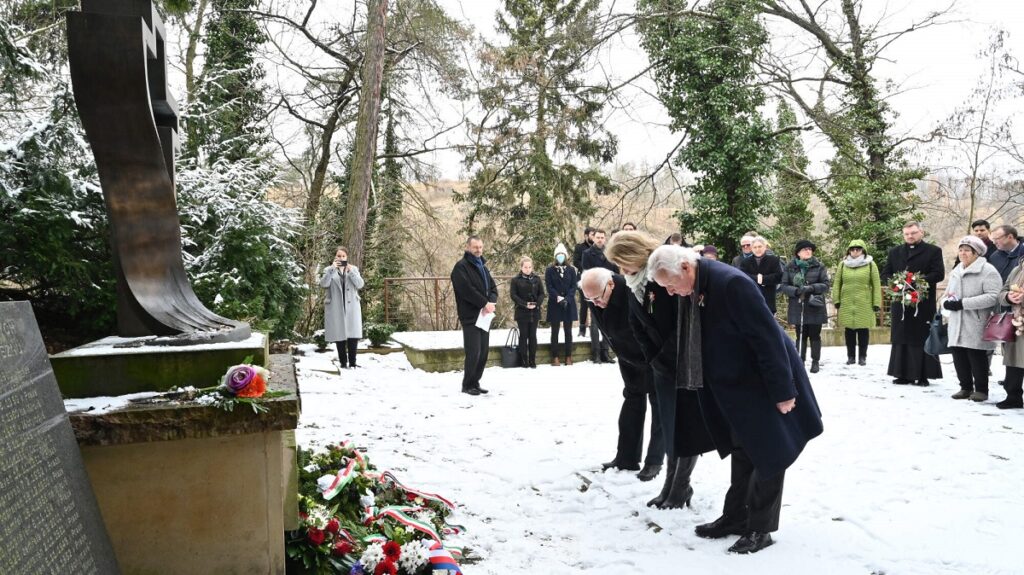
photo: János Fajd/felvidek.ma
This represents a huge breakthrough, capping this process by the fact that this year, he was also present at the presentation of the János Esterházy memorial medals in the Budapest Parliament. As he later stated, he was so touched by the spirit of the pilgrimage site and cave chapel in Alsóbodok, the commitment and respect of the faithful who showed up there for Esterházy, the testimonies of his former fellow prisoners and the priests imprisoned there, and the fact that he heard and studied the testimonies based on the facts of the martyred former about the sufferings of a prisoner, that he had to acknowledge the fact and legitimacy of the beatification. Of course, it will be difficult for Slovak public opinion, which ignores the facts, to change suddenly, but this can still be seen as a small, divine sign, which brings us a small step, but still closer to our goal of receiving János Esterházy into the great, heavenly world of saints. his family, which is not an issue for us today either.
The other very important thing, which the Slovak communist and nationalist side cannot separate from each other, is that the Catholic Church does not want to beatify the politician János Esterházy, but rather the martyr who suffered in prison and in the Christian faith, who prayed for others and helped others.
Of course, this does not mean that we would respect the career of the politician Esterházy any less or consider it worth following. In fact! The sobriety and commitment that he represented as a politician could still be studied by the politicians of today. They would find in it many good experiences and useful guides regarding Christian faith and moral commitment. It is quite a coincidence that we are in a situation now that the war raging in our neighborhood prompts the politicians of today to take action and make statements and resolutions, including the Hungarian representation of interests in the highlands. It would not be a negligible fact if they took the example of János Esterházy, who had to stand his ground in a similar, but even more complex, conflict affecting the whole of Europe, and he always knew what was the right path for him. And this was the divine way, and not the one expected by the Americans or any other great power.
We are aware, I agree, that it is not enough to respond to such Slovak journalistic statements in a few articles, but our conscience does not allow us to leave this disgraceful and shameful act without a word. Not only because Esterházy also always stood on the side of truth, and he did not escape from prison, even though he could have done so with foreign help, because he declared himself innocent and could not justify the perceived truth of his enemies by running away. The communists and their followers come and go, but the divine justice that we believe in as Christians will not be left behind. We know that God does not beat with a stick. Let him judge this act as well. He, in his own time.”
Source: Béla Hrubík/Felvidék.ma
(Header image: pazmaneum.com)

